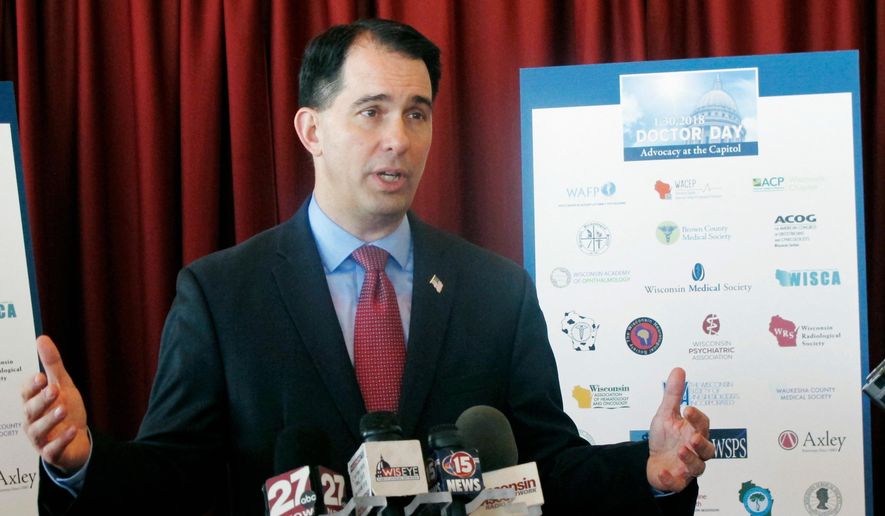Gov. Scott Walker is no stranger to tough races, with two elections and a historic recall victory behind him, but even he says this year’s fight will be among the most difficult Republicans have faced.
Long a target for Democrats angered by his rollback of public employee labor union bargaining rights and his defense of pro-life causes, Mr. Walker is one of the top targets as he seeks his third term.
“The wind’s not at our back. It’s not at our side. It is firmly in our face,” Mr. Walker acknowledged to supporters at a dinner last month. “This election is going to be tougher than any one I have been involved with, including the recall.”
Mr. Walker won election in the 2010 GOP wave, became the first governor in U.S. history to survive a recall in 2012, then won re-election on a second GOP wave in 2014.
After a failed presidential bid, he’s back to face his state’s voters with anti-Trump sentiment running high.
Mr. Walker plans to counter with a strategy of arguing to all of the state’s voters that he’s overseen a surging economy, while also urging Republicans to turn out and foil any impending Democratic wave.
His campaign already has run four election ads, hoping to create early momentum for the governor.
“While Democrats anxiously wait for a ’blue wave,’ the governor is getting things done with record-low unemployment, more people working than ever before, and a record investment of actual dollars in our classrooms — and pushing a conservative agenda to help Wisconsin win the 21st century with even higher goals for education, workforce, health care, taxes, and more,” said Brian Reisinger, a senior campaign adviser to Mr. Walker.
So far, Mr. Walker appears to be performing in the same margin of polling as he was heading into his 2014 re-election, but Democrats say this year their voters are more mobilized than ever before.
“What I see is a national political environment that impacts what happens in Wisconsin more and more,” said Joe Zepecki, a Democratic strategist in the state.
Democrats won’t learn who their nominee is until the August primary, when party voters will narrow a field of at least 13 candidates so far.
Both sides say a major dividing line for the general election will be the FoxConn deal reached earlier this year. Mr. Walker touted the manufacturing facility in southwest Wisconsin as a $10 billion investment in the state slated to produce 13,000 jobs to make LCD screens. Democrats, however, said the Taiwan-based company would cost the public $4.5 billion in tax credits over a 15-year period.
“Giving $4.5 billion to Foxconn rather than spending it on Wisconsin entrepreneurs and businesses and the needs previously mentioned has been widely unpopular,” said Melanie Conklin, spokeswoman for the Democratic Party of Wisconsin.
Democrats say an election earlier this year for the state Supreme Court, which saw liberal Judge Rebecca Dallet win, is a sign of the movement’s strength.
President Trump won the state by less than 1 point in 2016, and Sen. Ron Johnson, a Republican, won re-election on the same ballot.
The president has been a vocal advocate of the FoxConn deal. He’s already made a few visits to the state since he’s been elected, and Mr. Walker has said that he would likely appear with the president if he comes back this year.
Republicans acknowledge the headwinds for Mr. Walker but say his plan to focus on state issues, and the experience he gained in his past election battles facing down the labor unions, could help him hold the seat.
“Those unions were powerful. They had tons of money. They dwarfed Republicans,” said Brandon Scholz, a Republican strategist. “By winning that battle, Walker essentially took political power away from the unions.”
• Sally Persons can be reached at spersons@washingtontimes.com.




Please read our comment policy before commenting.